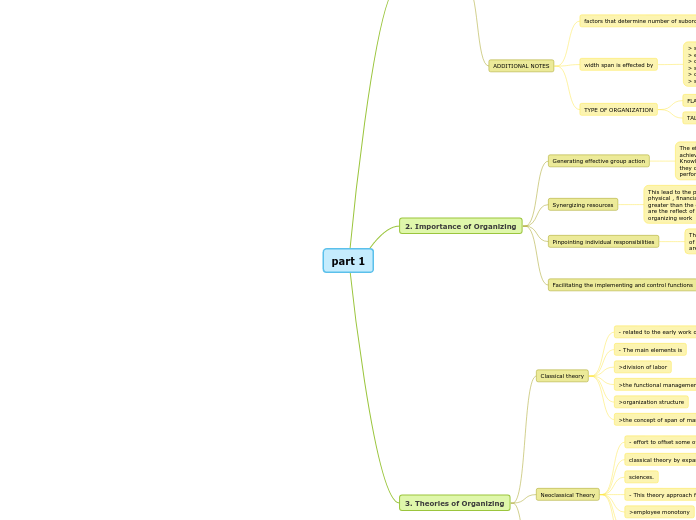part 1
definitions
unity of command and direction
command
concepts that each employee should report to only one boss.
direction
all activities are directed towards the same objectives
chain of command
clear line of authority from organizations top to its bottom
team captains are part of the chain that links to the coaches and players
span of management
has to do with how many employees report directly to the manager
number of employees that are effectively and efficiently supervised
no consensus on a specific number, but they favor small spans of less to maintain lose control
ADDITIONAL NOTES
factors that determine number of subordinates
> type of work
> location of organization structure
> ability of manager
> amount of type and communication required
width span is effected by
> skills and abilities of manager
> employee characteristics
> characteristics of being work done
> similarity of tasks
> complexity of tasks
> standardization of tasks
TYPE OF ORGANIZATION
FLAT
fewer layers of management with wide span of controls
TALL
many layers of management with narrow spans of controls
Importance of Organizing
Generating effective group action
The effort that come from employees are important to achieving the desire of the organizational objectives. Knowledge and skill of the employee are important so that they can give a positive imoact to the organization’s performance
Synergizing resources
This lead to the proper use of the resources which is human , physical , financial and information to get the result that is greater than the combined starting values of resources. This are the reflect of the effort which is the primary purpose of organizing work
Pinpointing individual responsibilities
The major reason is to specify the duties and responsibilities of individual employees. Lined of authority and accountability are defined and clarified
Facilitating the implementing and control functions
A good organizing can consider to an interpersonal relationships , the work environment and the control of the result . A workers can perform best when they are following the conditions which is first their jobs skills and knowledge are right for the job . Second working conditions are pleasent and third they have a clear understanding of their duties and responsibilities
Theories of Organizing
Classical theory
- related to the early work of Taylor, Fayol and other
- The main elements is
>division of labor
>the functional management process
>organization structure
>the concept of span of management.
Neoclassical Theory
- effort to offset some of the shortcomings of the
classical theory by expanding into the behavioral
sciences.
- This theory approach focuses on problem such as
>employee monotony
>fatigue
>isolation insignificance
Modern organization theory
- The uniqueness of this theory is that it studies the
organization as a system.
- Modern theorists consider the organization to be a
system composed
>the following strategic parts
>status and role patterns
>the physical environment of work
PART 2
RECRUITMENT PROCESS
internal resources
promotion from within
- employee referrals
- previous applications
external resources
- walk ins
- educational institutions
- advertising
- agencies
HUMAN RESOURCE NEED
job analysis
- job description
- job specifications
review source of applicants
select the source of applicants
publicise job openings
JOB ANALYSIS COMPONENTS
Job Description
- job description identifies the tasks and responsibilities of a position.
- A written statement of what the job holder does, how it is done, and why it is done.
>Tasks, duties and responsibilities that the job entails
job specifivation
- A written statement of the minimum qualifications that a person
must possess to perform a given job successfully.
- identify the types of people needed.
>Knowledge, skills, and abilities required of the job holder
job design
Technique
a) Job rotation is a process by which employees laterally
mobilize and serve their tasks in different organizational levels.
b) Job enlargement means increasing the scope of a job
through extending the range of its job duties and
responsibilities generally within the same level and
periphery.
c) Job enrichment can be described as a medium through which management can motivate self-driven employees by assigning them additional responsibility normally reserved for higher level employees.
RECRUITMENT & DECRUITMENT
Recruitment
The process of locating, identifying, and attracting
capable applicants to an organization.
Decruitment
reducing a surplus of employees in the
workforce of an organization. Decruitment options
include firing, layoffs.
RECRUITMENT SOURCES
INTERNAL RECRUITING
Internal recruiting involves filling job openings with current employees or personal referrals.
i) Promotion from within
ii) Employee referrals
EXTERNAL RECRUITING
i) Walk-ins
ii) Educational institutions
iii) Agencies
iv) Advertising
The importance of HRM
HRM process
- Keeping that competent employee are identified and selected
- Helo the employee with an up-to-date knowledge and skill for their jobs
- Had to ensure the organization give a high-performing employee that are capable of high performance
Employment Planning
- Help to avoid sudden talent shortage and surpluses
- Had to ensure the management has the right number and kind of people in the right places at the right time , help the organization to achieve their goals
PLANNING STEP
First : Assessing current human resources
Second : Assessing future needs for human resources
Third : Developing a programme to meet those the future need
